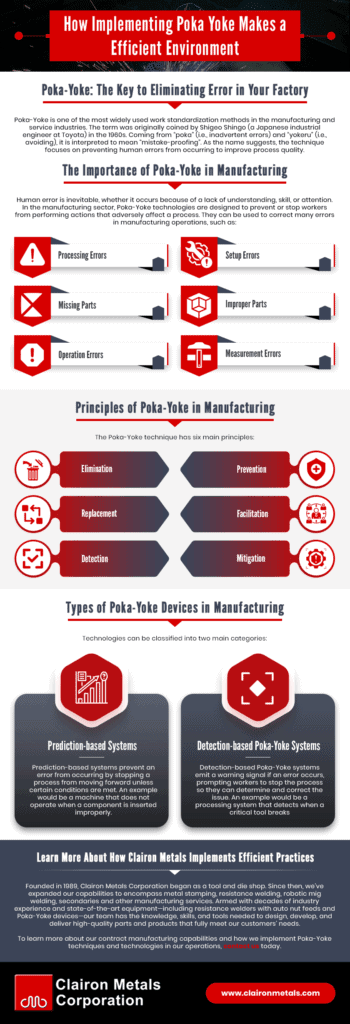Poka-Yoke is one of the most widely used work standardization methods in the manufacturing and service industries. The term was originally coined by Shigeo Shingo (a Japanese industrial engineer at Toyota) in the 1960s. Coming from “poka” (i.e., inadvertent errors) and “yokeru” (i.e., avoiding), it is interpreted to mean “mistake-proofing”. As the name suggests, the technique focuses on preventing human errors from occurring to improve process quality.
The Importance of Poka-Yoke in Manufacturing
Human error is inevitable, whether it occurs because of a lack of understanding, skill, or attention. In the manufacturing sector, Poka-Yoke technologies are designed to prevent or stop workers from performing actions that adversely affect a process. They can be used to correct many errors in manufacturing operations, such as:
- Processing errors: when operations are missed or not performed according to the standard operating procedure
- Setup errors: when the wrong tooling or machine settings are used
- Missing parts: when parts are not present for the operation
- Improper parts: when the wrong part is present for the operation
- Operation errors: when operations are carried out incorrectly or to the wrong specs
- Measurement errors: when there are errors in test measurements, machine adjustments, or incorrect dimensions coming from an outside supplier
Principles of Poka-Yoke in Manufacturing
The Poka-Yoke technique has six main principles:
- Elimination: redesigning the product or process to remove the part or task that invites the potential for error
- Prevention: designing and engineering the product or process such that it is impossible to make the error
- Replacement: substituting the product or process with one that is more reliable and consistent
- Facilitation: combining steps and employing techniques to streamline operations
- Detection: identifying and correcting process errors before they result in additional complications
- Mitigation: minimizing the effects of errors on the process
Types of Poka-Yoke Devices in Manufacturing
Technologies can be classified into two main categories:
- Prediction-based systems prevent an error from occurring by stopping a process from moving forward unless certain conditions are met. An example would be a machine that does not operate when a component is inserted improperly.
- Detection-based Poka-Yoke systems emit a warning signal if an error occurs, prompting workers to stop the process so they can determine and correct the issue. An example would be a processing system that detects when a critical tool breaks.
Learn More About How Clairon Metals Implements Efficient Practices
Founded in 1989, Clairon Metals Corporation began as a tool and die shop. Since then, we’ve expanded our capabilities to encompass metal stamping, resistance welding, robotic mig welding, secondaries and other manufacturing services. Armed with decades of industry experience and state-of-the-art equipment—including resistance welders with auto nut feeds and Poka-Yoke devices—our team has the knowledge, skills, and tools needed to design, develop, and deliver high-quality parts and products that fully meet our customers’ needs.
To learn more about our contract manufacturing capabilities and how we implement Poka-Yoke techniques and technologies in our operations, contact us today.

